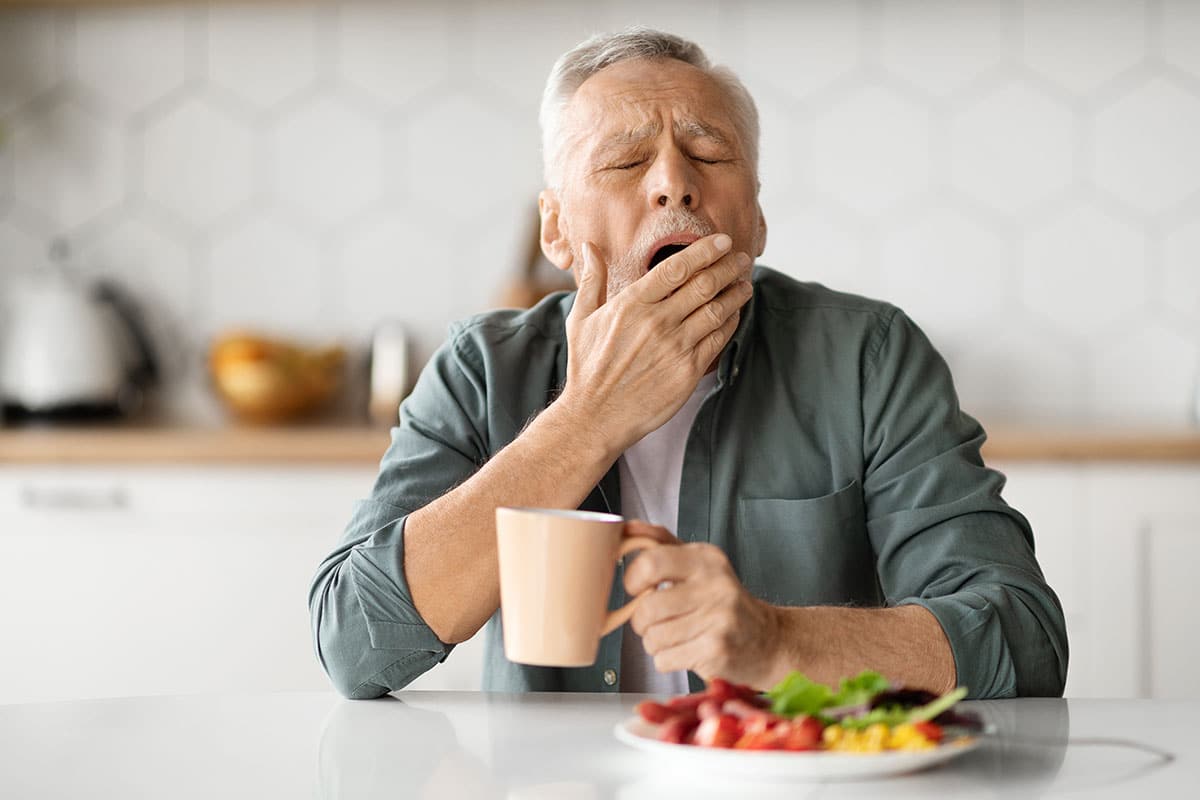
We’ve talked in previous blog articles about how important it is to get enough sleep, and that the average adult needs between seven and nine hours of good quality sleep every night to help maintain optimal health, well-being, and function at ones best.
But what about older people? Do sleep and ageing impact each other? How much sleep do seniors and the elderly need, and does ageing affect sleep?
Sleep does indeed change as we age – yet, contrary to common belief, older people require just as much sleep as their younger counterparts. This is, however, not as easily achieved – and an older person’s sleeping patterns will likely alter over time.
- 40% of older people have at least one short (30-minute) nap daily.
- Most people over age 80 nap for more than an hour daily.
- Older people, especially women, often take much longer to fall asleep at night.
- Older people tend to only manage light sleep – waking more often and not as well-rested.
The incidence of sleep disorders increases with age – and certain medical conditions that are more common in older people can also disrupt sleeping patterns and depth.
How Does Ageing Affect Sleep?
Our sleeping patterns are governed by our body clock and circadian rhythms, which also control hunger. From middle age, the body clock changes, and hormones such as melatonin that control the sleep-wake cycle are released earlier in the day. Melatonin production also diminishes overall with age –further impacting sleep patterns and quality. Older people may feel sleepier and go to bed earlier than they did in the past, but then they’ll often wake in the early hours of the morning and struggle to get back to sleep. They’ll also wake for the day earlier in the morning.
Several other factors may contribute to sleep disruption in older people, including:
- Health conditions, including heart and lung diseases, diabetes, Dementia and Alzheimer’s, and Parkinson’s disease.
- Anxiety and depression.
- Postmenopausal hot flashes, night sweats, and insomnia in women.
- Nocturia (increased need to urinate throughout the night – especially in men due to common prostate issues).
- Pain due to arthritis, osteoporosis, and other issues of ageing.
- Periodic limb movement disorder or restless leg syndrome.
- Gastroesophageal reflux/indigestion.
- Daytime napping habits.
- Certain medications.
40% of older people habitually suffer from insomnia, and 67% of residents in nursing homes have poor-quality sleep.1
People also often have a less structured lifestyle in retirement, including their sleep-wake cycle – which has a domino effect.
Sleep apnoea plays a significant role in sleep changes for older people – according to the Australian Sleep Health Foundation, at least one in four older people experience this serious medical condition, many undiagnosed. Likewise, snoring is disruptive to a good night’s sleep and has wide health ramifications.
The Importance of Good Sleep as we Age
Numerous health conditions go hand-in-hand with ageing, and poor-quality sleep contributes further to these.
Not only does ageing negatively impact sleep, but poor sleep habits and compromised sleep quality can speed up ageing processes and contribute to poor health.
Failure to get a good night’s sleep increases risks of irritability, memory and concentration issues, depression, and anxiety, falls and other accidents.
Tips for Older People to Get Better Sleep
- Maintain a regular sleep schedule. Try to go to sleep at the same time every night and get up at the same time every day. Don’t go to bed too early, and don’t sleep in too late. See some strategies here.
- Avoid excessive daytime napping. Older people tend to take shorter naps than younger people – but more of them. Short daytime naps of 30 minutes or less are fine (and can be good for you) – but only one per day and not after around 3 pm.
- Try to get plenty of natural sunlight exposure in the morning and late afternoon. This will help to reset your body clock and sensitise you to sleep when it is naturally dark.
- Move daily. Exercise is an important part of a healthy lifestyle – and it helps us fall asleep quicker, stay asleep longer, and sleep more deeply. Some older people may well struggle to exercise, but even a gentle walk each day around the block, to the corner, to the letterbox, or around your back garden can make all the difference – do what you are safely capable of.
- Ask your GP about melatonin supplementation. Melatonin is a natural hormone produced by the body. Its synthetic formulation can be purchased at low dosage over the counter in your local pharmacy and is also available at higher doses with a prescription from your doctor. This is a much safer approach than using sleeping tablets.
- Understand sleep hygiene, a bedtime routine, and find what works for you. This includes removing distractions like television and electronics from the bedroom. You also need to avoid caffeine, nicotine, eating large evening meals or late at night, and excessive alcohol consumption. See strategies here.
- Address snoring and sleep apnoea. These are both enemies of sleep and good health. Learn more here and here.
- Get Help. See your GP for advice and strategies (and specialist referrals if necessary) to help you address the issues that are disrupting your sleep. From insomnia to excessive daytime sleepiness, obstructive sleep apnoea, mental health concerns, heartburn, pain, snoring, and more, they can help you.
Get the World-Class Anti-Snoring Device – SnoreMD
Good quality sleep is vital for good health – and one way to improve your sleep is to stop snoring.
SnoreMD is the Australian brand of a patented, medically engineered stop-snoring device. It is worn in the mouth during sleep and gently moves the lower jaw slightly forward. This helps to open the airways and minimises or even stops snoring.
SnoreMD is safe, comfortable, reusable in the long term, budget-friendly, and suitable for adults of any age to use. It could be the key to getting your sleep back on track.


